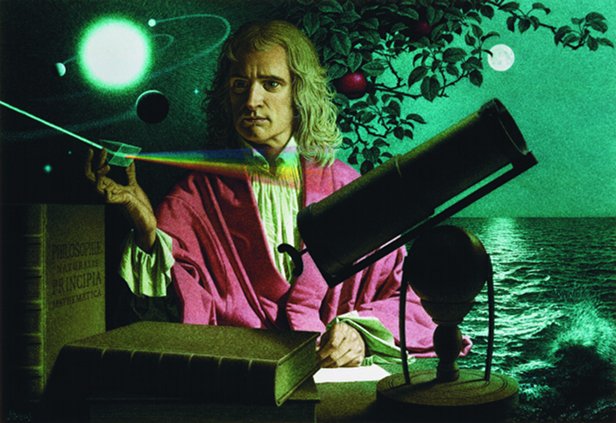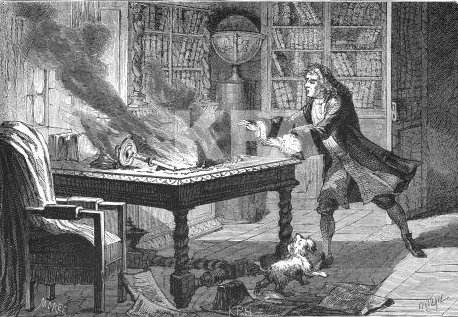
The Sir Isaac NEWTON'S CHILDHOOD.
SIR ISAAC NEWTON is the greatest of modern philosophers and mechanics. When he was born, December 25, 1642, three months after his father's death, he was so small and feeble that no one supposed he would live a, day; but the weak infant grew to be a healthy, robust man, who lived until he was eighty-four years old. He began to invent, or contrive, machines and to show his taste for mechanics in early childhood.
He inherited some property from his father; his mother, who had married a second time, sent him to the best schools, and to the University of Cambridge. At school he soon showed his natural taste; he amused himself with little saws, hatchets, hammers and different tools, and when his companions were at play, • he spent his time in making machines and toys. He made a wooden clock when he was twelve years old, and the model of a windmill, and in his mill he put a mouse, which he called his miller, and which turned the wheels by running around its cage. He made a water clock four feet high, and a cart with four wheels, not unlike a velocipede, in which he could drive himself by turning a wind-lass.
His love of mechanics often interrupted his studies at school, and he was sometimes making clocks and carriages when he ought to have been construing Latin and Greek. But his mind was so active that he easily caught up again with his fellow scholars, and was always fond of every kind of knowledge. He taught the school-boys how to make paper kites; he made paper lanterns by which to go to school in the dark winter mornings; and sometimes at night he would alarm the whole country round by raising his kites in the air with a paper lantern attached to the tail; they would shine like meteors in the distance, and the country people, at that time very ignorant, would fancy them omens of evil, and celestial lights.
He was never idle for a moment. He learned to draw and sketch; he made little tables and side-boards for children to play with; he watched the motions of the sun by means of pegs he had fixed in the wall of the house where he lived, and marked every hour.
At last, when he was about sixteen, his mother placed him in charge of a farm, and every Saturday he went with a servant to Grantham market to sell his corn and vegetables. But the affairs of the farm did not prosper; the young philosopher hid himself away in a room in a garret, which he hired, studying mechanics and inventing a water-wheel on a new model, while the sheep wandered away in the field, and the cattle devoured the corn.
Next he went to Cambridge University, and became a famous scholar. At the age of twenty-four he began his study of the spectrum,, as philosophers call that brilliant picture of the colors of the rainbow, which is shown by the sun's rays shining through a three-sided piece of glass, called a prism.
It is one of the most beautiful objects in science or nature, and Newton's study of its splendid colors led to his greatest discoveries of optics, or the science of the sight. In our own time the use of the prism and its spectrum has shown us of what the sun and moon are composed.
One day as Newton sat musing in his garden at his retired country home, an apple fell from a tree to the ground. A great idea at once arose in his mind, and he conceived the plan of the universe and of the law of gravitation, as it is called.
He was the first to discover that famous law.-He showed that the heavier body always attracts the lighter; that as the apple falls to the earth, so the earth is drawn toward the sun; that all the planets feel the law of gravitation, and that all the universe seems to obey one will. Newton soon became the most famous of living philosophers.
But at the same time he was the most modest of men; he never knew that he had done anything more than others, nor felt that he was any more studious or busy. Yet he never ceased to show, even in late old age, the same love for mechanical pursuits and the study of nature he had shown when a boy. His most famous work, the "Principia," proving the law of gravitation and the motion of the planets, appeared in 1687. He made beautiful prisms of glass and other substances, and fine reflecting telescopes, the best that were yet known. He wrote valuable histories and works. He was always a devout Christian and scholar. He died in 1727, and was buried in Westminster Abbey.
Thus the puny baby that was scarcely thought worth the care of his nurses, became an active and
healthy boy and man, with the clearest mind of his time. He was stout, ruddy, healthy, and never, it is said, lost a tooth. But he preserved his health by avoiding all that was hurtful. He was a philosopher at twelve years old, and the world owes much of its progress to Newton's well-spent childhood.
—Harper's Young People.
